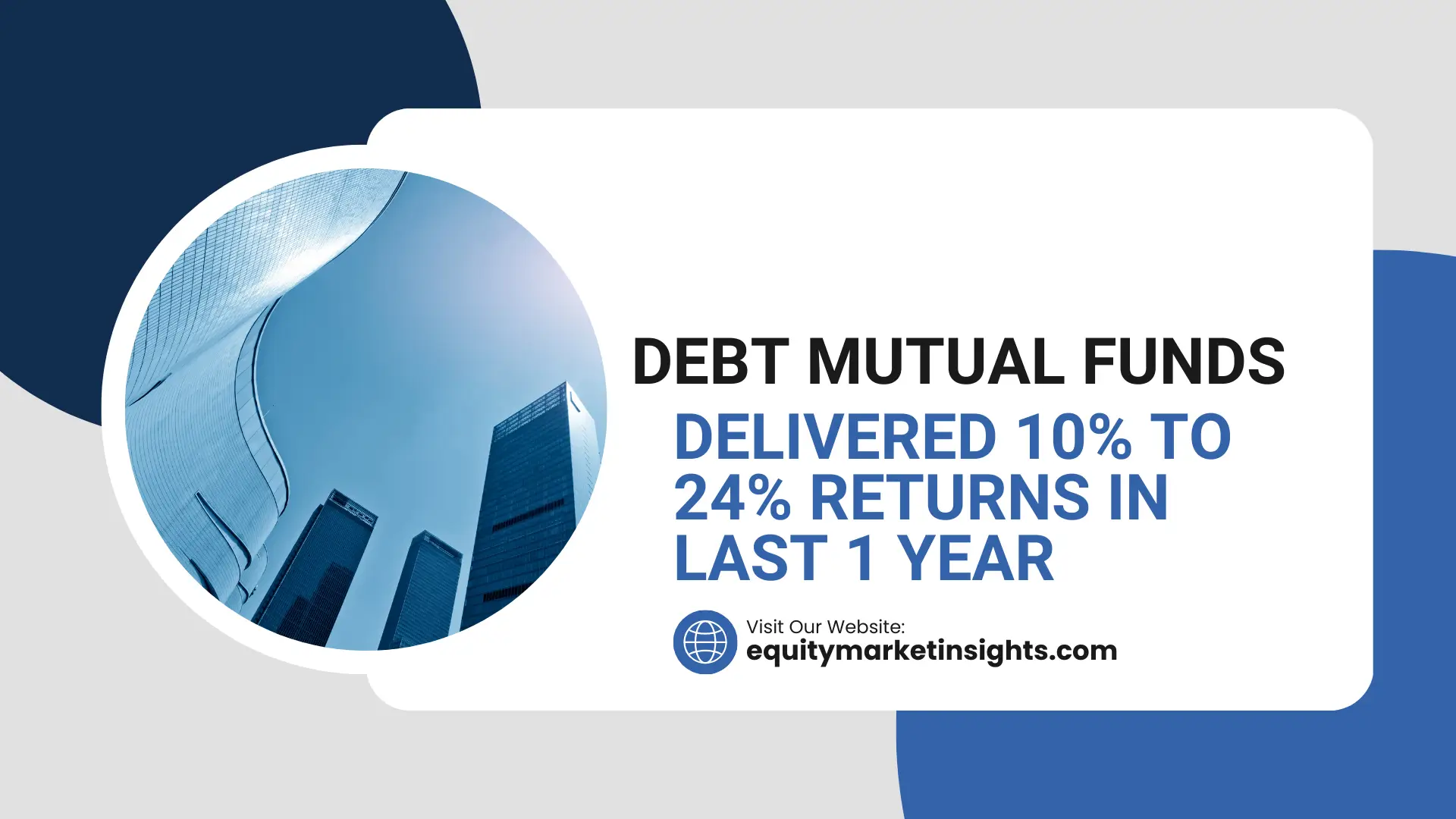Debt mutual funds are usually seen as a safe option compared to equity funds. They generally invest in fixed-income products like government bonds, corporate bonds, and treasury bills. Most investors pick them for stability and regular income. But the past one year (2024–2025) surprised everyone as some debt funds generated extraordinary returns ranging between 10% and 24%.
This sudden performance has raised curiosity among both conservative and aggressive investors. Let’s look at the Top 10 Debt Mutual Funds that gave the best returns in the last one year, along with their objectives, risks, and who should consider them.
Investors often get confused about which category of fund to choose. For more detailed analysis and updated recommendations, head over to our Equity Market Insights Portal, where we cover mutual funds, IPOs, and stock market insights.”
Top 10 Debt Mutual Funds 2025 – 1-Year Returns
| Debt Fund Scheme | 1-Year Return (%) |
|---|---|
| DSP Credit Risk Fund | 22.93% |
| HSBC Credit Risk Fund | 21.68% |
| Aditya Birla Sun Life Credit Risk Fund | 17.40% |
| Aditya Birla Sun Life Medium Term Plan | 13.81% |
| Franklin India Income Plus Arbitrage Active FoF | 13.80% |
| Nippon India Medium Duration Fund | 11.00% |
| Invesco India Credit Risk Fund | 10.72% |
| Nippon India Credit Risk Fund | 10.34% |
| Franklin India Corporate Debt Fund | 10.21% |
| Bank of India Short Term Income Fund | 10.13% |
Why Did Debt Funds Perform So Well?
Normally, debt funds give moderate returns (5%–8%), but in the last one year, several credit risk funds and medium-term funds shot up because:
- Companies with lower credit ratings paid higher interest to raise money, which boosted yields.
- Market volatility created chances for arbitrage-based funds.
- Falling bond yields benefited funds holding medium-term papers.
This mix of market factors helped some debt schemes deliver equity-like returns.
Detailed Look at the Funds
DSP Credit Risk Fund
- 1-Year Return: 22.93%
- Focus: Invests mainly in corporate bonds with credit opportunities.
- Investor Type: Suited for investors with higher risk appetite who want more than FD returns.
- Risk: Default risk from lower-rated bonds.
HSBC Credit Risk Fund
- 1-Year Return: 21.68%
- Focus: Income from corporate bonds with moderate credit risk.
- Investor Type: Investors aiming for high yield with tolerance for credit risk.
- Risk: Liquidity issues in volatile markets.
Aditya Birla Sun Life Credit Risk Fund
- 1-Year Return: 17.40%
- Focus: Corporate debt investments with higher yield.
- Investor Type: Medium to long-term investors wanting better than average debt returns.
- Risk: Sensitive to changes in credit ratings.
Aditya Birla Sun Life Medium Term Plan
- 1-Year Return: 13.81%
- Focus: Medium duration bonds for stable income.
- Investor Type: Suitable for investors with 3–5 year horizon.
- Risk: Interest rate movements.
Franklin India Income Plus Arbitrage Active FoF
- 1-Year Return: 13.80%
- Focus: Arbitrage plus fixed income.
- Investor Type: Very conservative investors looking for steady returns.
- Risk: Returns depend on arbitrage opportunities.
Nippon India Medium Duration Fund
- 1-Year Return: 11.00%
- Focus: Debt + money market papers with medium maturity.
- Investor Type: Good for those looking for steady income.
- Risk: Moderate credit and interest rate exposure.
Invesco India Credit Risk Fund
- 1-Year Return: 10.72%
- Focus: Lower-rated corporate bonds.
- Investor Type: Long-term investors seeking higher income.
- Risk: Higher credit risk.
Nippon India Credit Risk Fund
- 1-Year Return: 10.34%
- Focus: Corporate bonds with credit risk exposure.
- Investor Type: Investors ready for moderate risk with 3–5 year view.
- Risk: Credit downgrades or defaults.
Franklin India Corporate Debt Fund
- 1-Year Return: 10.21%
- Focus: Safer, high-quality corporate debt.
- Investor Type: Conservative investors looking for predictable income.
- Risk: Low, but interest rate sensitive.
Bank of India Short Term Income Fund
- 1-Year Return: 10.13%
- Focus: Short-term debt instruments.
- Investor Type: Suitable for conservative investors seeking stability.
- Risk: Low, but linked to short-term interest rate movements.
Who Should Invest in These Funds?
- Conservative Investors: Can look at corporate debt funds and short-term funds.
- Moderate to Aggressive Investors: Can explore credit risk funds for higher returns, but must be ready to face risks like defaults.
- Medium-Term Planners (3–5 years): Medium duration funds are a good fit.
Conclusion
Debt mutual funds surprised everyone in 2025 by giving equity-like returns in some categories. Credit risk funds topped the list with returns above 20%, but they come with higher default risks. Medium-term and arbitrage funds provided a safer balance of risk and return.
For investors, the lesson is simple: don’t assume debt funds are always risk-free. Choosing the right fund depends on your risk appetite, time horizon, and financial goals. Conservative investors should stay with short-term or corporate debt funds, while aggressive ones may explore credit risk funds for higher yields.
FAQs
What are Debt Mutual Funds?
Debt mutual funds are investment schemes that put money into fixed-income instruments like government securities, corporate bonds, and money market papers.
Are Debt Funds Safe?
They are safer compared to equity funds, but not completely risk-free. Risks like credit default and interest rate fluctuations are always present.
Why did Credit Risk Funds give such high returns in 2025?
They invested in lower-rated bonds that offered higher yields. As these companies paid high interest, funds generated exceptional returns.
Who should avoid Credit Risk Funds?
Very conservative investors, retirees, or those who can’t handle market fluctuations should avoid credit risk funds.
What is the best choice for conservative investors?
Short-term debt funds and high-quality corporate debt funds are safer options with stable income.

